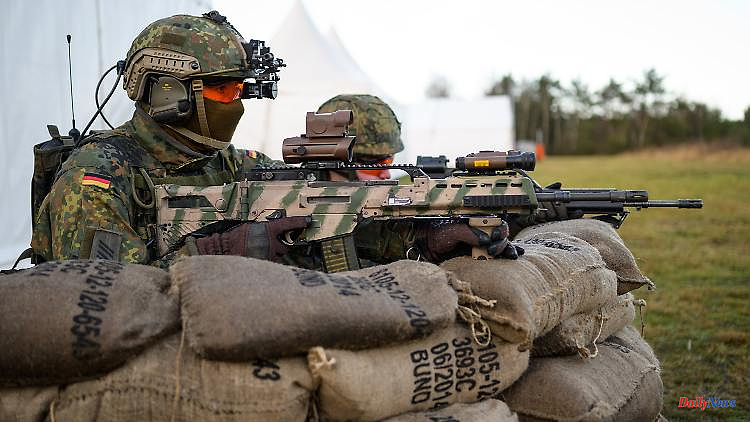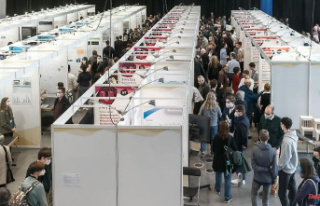SPD leader Esken does not believe that the two percent target can be achieved every year. In principle, however, the 100 billion euro special fund for the Bundeswehr now seems within reach. In the evening Ampel and Union negotiate again - time is short.
In their negotiations on a 100 billion euro special fund for the Bundeswehr, the coalition and the Union have come closer. This means that orders for weapons from the armaments industry are getting closer on a large scale. After two initially unsuccessful negotiations, representatives of the CDU/CSU and the traffic light coalition want to discuss the legal basis for this again in the evening.
In reaction to Russia's invasion of Ukraine, Federal Chancellor Olaf Scholz announced a massive rearmament in the Bundestag on February 27: The budget would be provided with a one-off special fund of 100 billion euros for investments in armaments projects; The SPD politician promised that more than two percent of the gross domestic product would be invested in defense every year. Because the special fund is to be anchored in the Basic Law, a two-thirds majority is required in the Bundestag and Bundesrat. The coalition is therefore dependent on votes from the opposition.
Economics Minister Robert Habeck is counting on an agreement, as the Greens of the "Welt am Sonntag" said. This should include "that the Bundeswehr receives as many new weapons and functional equipment as possible and that the financing of necessary security-related systems is not ruled out". The first parliamentary director of the Union faction, Thorsten Frei, was optimistic in the "Rheinische Post" that "we can reach an agreement on Sunday".
In the online edition of the newspaper, CSU regional group leader Alexander Dobrindt insisted on keeping Scholz's promise: "100 billion euros for the armed forces and permanently achieve the two percent target - we expect the traffic light to keep this double promise and it concretely filled with life." That means anchoring the special fund in the Basic Law and codifying the two percent target in a simple law. "We offer our support to the traffic light for this path."
The government factions also said at the weekend that compliance with the two percent target should probably not be anchored in the Basic Law. The main reason is that the gross domestic product is not yet known when the budget is set and a violation of the Basic Law should be avoided. The Federal Statistical Office reports the result of calculations on GDP around 15 days after the end of a year.
Nevertheless, SPD leader Saskia Esken announced in the "Frankfurter Allgemeine Sunday newspaper": "We will not reach the two percent target equally every year." If you order large equipment today, you won't get it for three or four years. "The amounts may not be as high in the first two years, and then there comes a year when a lot becomes necessary."
An agreement is also emerging in the further parliamentary monitoring of armaments procurement. This should happen in a subcommittee of the budget committee, it was said in the circles. There was also movement on the question of a repayment plan for the planned loans, it said.
The Union wanted to make it clear that the special fund will only be used for the Bundeswehr. A previously planned formulation - "to strengthen alliance and defense capability" - was too unspecific for her. Habeck said: "In my opinion, this debate about money is easy to solve." It is undisputed that the Bundeswehr is now being made operational. "But the country's ability to defend itself is not defined solely by the number of weapons it has, but also by protection against digital attacks on critical infrastructure." If the Greens have their way, the fresh money will also be used to finance cyber defense and support for partner countries. Union faction Vice Mathias Middelberg told the "Rheinische Post" that the search for a compromise was difficult here. "It must be clear that the special fund will be used for the Bundeswehr and not for other purposes.
The defense policy spokesman for the FDP parliamentary group, Alexander Müller, said: "The special fund must be included in the Basic Law before the summer break, otherwise we will lose a lot of time." Before the industry hires new staff and orders materials and preliminary products, they want to be sure that the funds are also legally secured. "The necessary ships, vehicles and protective vests are not in the shop window, but have to be produced again." The Green politician Anton Hofreiter told the "Rheinische Post" that the pressure of expectations on the part of the allies was great in many areas. "
SPD parliamentary group leader Rolf Mützenich referred to the question of when an agreement had to be reached by this week's planned adoption of the budget. "It makes sense to also decide on the special fund," he told the "Passauer Neue Presse". It was previously unclear whether the talks in the evening would bring a breakthrough or whether negotiations would continue afterwards. Informing the public in the evening was initially not planned.












